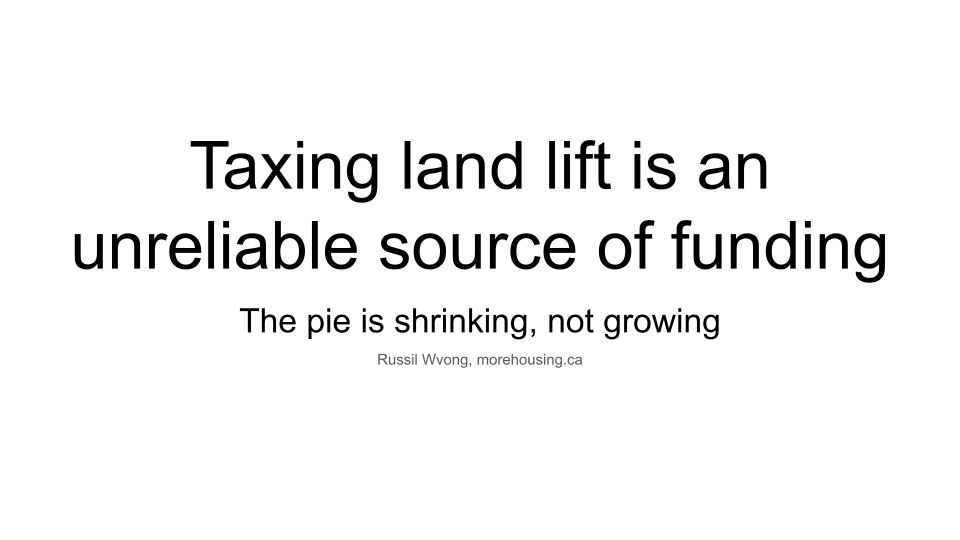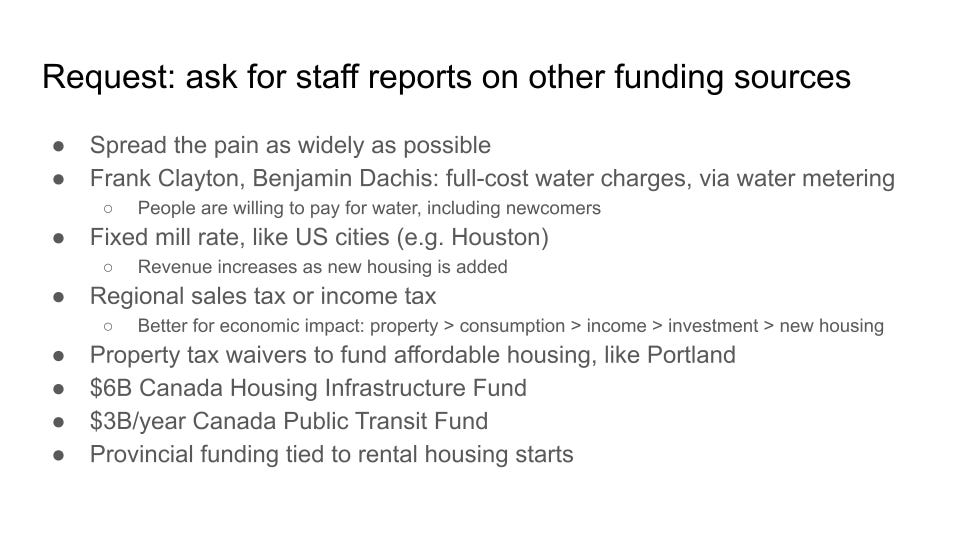Taxing land lift is an unreliable source of revenue
The pie is shrinking, not growing
The Metro Vancouver Regional District board is having a meeting this Friday to approve its budget. I’ve asked to make a five-minute presentation.
I’m trying to appeal primarily to self-interest, rather than to cooperation: I’m arguing that taxing new housing heavily is a bad idea because it’s an unreliable source of revenue (as opposed to arguing that it’s a bad idea because it’s unfair to younger people and renters, or that it’s jeopardizing the development industry).
I watched a council meeting recently where there was a lot of discussion of how to divide up the density-bonus revenue from the project, as if it’s a pie. How much should go to below-market housing? How much should go to new public amenities, like a library or a community centre? The problem is, the pie is actually shrinking, not growing.
Hi, my name is Russil Wvong. Thank you for serving in office, both municipally and on the Metro Vancouver board of directors. I’m a volunteer with the Vancouver Area Neighbours Association.
We’re concerned about municipal governments and Metro Vancouver relying on taxing land lift to provide revenue. I don’t think it’s widely understood that even though prices and rents are high, this pie is actually shrinking, not growing.
Municipal funding is certainly a huge challenge. It’s difficult to find enough money to keep infrastructure in a state of good repair. There’s the cost of water and sewer upgrades. There’s major capital projects. There’s TransLink, which is dealing with a huge structural deficit.
In short, there’s a lot of needs at the local level, and people’s willingness to pay higher property taxes is limited. So taxing new housing seems like an opportunity to raise badly-needed revenue. When prices and rents are so high, how can the pie be shrinking? The answer is that it’s value minus costs, and costs have been going way up.
This graph shows an analysis by Coriolis, from March 2019, of a strata high-rise project in Burnaby. The value of the new building is the total height on the right. After you subtract the costs of building it, that’s how much the project can pay for land. The green part is the land lift.
When prices are rising and costs are stable, this looks great. Municipalities can take 70-80% of the land lift, providing much-needed revenue. The problem is what happens when prices stop rising, and when costs go up. The green part shrinks really rapidly.
The reason is that it’s a residual, which makes it volatile. It’s a bit like leverage for a homeowner who’s just put 20% down. Small changes in prices result in large changes in their equity. Similarly, if land value is initially about 20% of the total, and prices decrease just 3%, that translates to a 15% drop in land value. If costs increase 7%, that translates to a 30% drop in land value.
So when redevelopment land values drop, they don’t just decline, they plummet. Naturally landowners are less willing to redevelop, or to sell for redevelopment. Altus reports that last year, land sales are way down.
This graphic illustrates what happens when costs go up, shown in orange. That pushes more projects underwater, below the rate of return where they’re economically viable.
As the mayors heard a couple weeks ago from the development industry, a lot of projects are in deep trouble. Municipalities could counter these increased headwinds by cutting their taxes on new housing, but they’re relying on that money. Instead, everyone’s planning to raise taxes on new housing, which is going to push even more projects underwater. The result is that a lot of projects simply won’t happen, and they’ll generate zero revenue. For example, in 2023, Burnaby only received one-quarter of the $230 million in revenue it expected from its community benefit bonus program. That’s a big shortfall.
The other big problem is, this isn’t just temporary. Over the longer term, revenue from taxing land lift will keep shrinking. Prices reflect scarcity. People are super-mad about housing scarcity, especially younger people, so senior governments are pushing hard to reduce it, cutting population growth and increasing housing supply. Both of these put downward pressure on prices and rents. It’s like gas-tax revenue shrinking as we switch to electric vehicles.
So I have a specific request, in your role both as Metro Vancouver directors and as municipal elected officials. I’d suggest that you ask your respective staff people to report back on alternative sources of funding. In general, you probably want to spread the pain as widely as possible.
Some specific suggestions:
Frank Clayton at Toronto Metropolitan University proposes using full-cost water charges, via water metering, the same way that we pay for electricity infrastructure.
In US cities like Houston, it’s common to use a fixed mill rate. That way, revenue automatically increases as new housing is added.
Another idea I’ve heard mentioned is a regional sales tax or income tax. In terms of minimizing economic impact, economists recommend taxing property, then consumption. Taxing income discourages labour, taxing investment reduces our productivity growth, and taxing a narrow base like new housing is worst of all.
It’s common practice right now to require new housing to include some percentage of below-market housing, so that the market housing is cross-subsidizing it. Unfortunately this pushes the rents on the market side even higher and out of reach for more people, creating housing need faster than you can fill it. An alternative is to use property tax waivers to pay for it, like Portland does.
Finally, I’d suggest taking a look at the funding which senior levels of government are already offering.
More
Two requests to Metro Vancouver Regional District. A presentation I did last November.
Municipal finance ideas. If ratcheting up prices and rents is a terrible idea, where else are local governments supposed to get the money?
Metro Vancouver budget workshop, October 16. Proposed Metro Van increase on property owners: $90/year. On renters trying to find a place: $600/year.
Video from a special meeting between people from the development industry (led by Beau Jarvis of Wesgroup) and Metro Van mayors, October 17. The mayors didn't seem particularly open to the idea that the planned DCC increases will make things worse.
Major civic project funding on the line as Burnaby saw $175M shortfall in developer money last year. Lauren Vanderdeen, Burnaby Now, May 2024.










.png)

.png)
Really great points. It makes no sense to me that cities can charge new entrants to the market these exorbitant fees and allow current homeowners to enjoy the services that are provided by these fees, at no cost to them. Seems entirely undemocratic. And you're right, now that fees are so high, there will be no new entrants to the market, which means the whole funding model falls apart.
Here's my understanding: by capturing land lift, governments reinforce the land lift phenomenon and high housing prices. If the government backs off, developers and renters/owners will both benefit. Revenue-wise, a fairer approach would collect from user fees and property taxes, and not rely too much on renters and buyers.
Would comprehensive upzoning (instead of spot) reduce the steep land lift phenomena? Would this increase valuations everywhere more evenly and increase city-wide revenues?